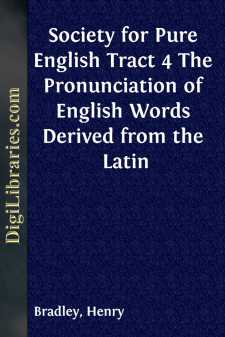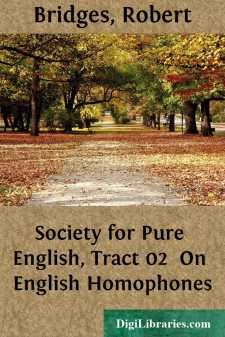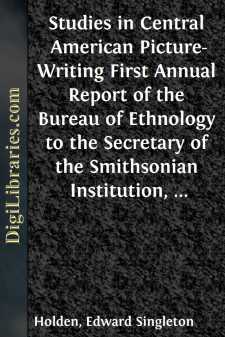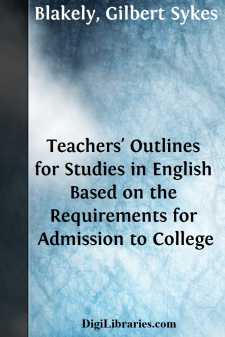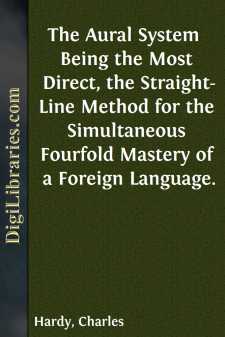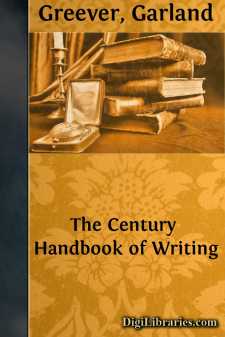Language Arts & Disciplines
Language Arts & Disciplines Books
Sort by:
by:
Henry Bradley
ON THE PRONUNCIATION OF ENGLISH WORDS DERIVED FROM LATIN [This paper may perhaps need a few words of introduction concerning the history of the pronunciation of Latin in England. The Latin taught by Pope Gregory's missionaries to their English converts at the beginning of the seventh century was a living language. Its pronunciation, in the mouths of educated people when they spoke carefully, was...
more...
by:
Robert Bridges
ENGLISH HOMOPHONES Definition of homophone. When two or more words different in origin and signification are pronounced alike, whether they are alike or not in their spelling, they are said to be homophonous, or homophones of each other. Such words if spoken without context are of ambiguous signification. Homophone is strictly a relative term, but it is convenient to use it absolutely, and to call any...
more...
CHAPTER I. SOME STORIES OF BRITISH HISTORY TOLD FROM ENGLISH WORDS. Nearly all children must remember times when a word they know quite well and use often has suddenly seemed very strange to them. Perhaps they began repeating the word half to themselves again and again, and wondered why they had never noticed before what a queer word it is. Then generally they have forgotten all about it, and the next...
more...
Since 1876 I have been familiar with the works of Mr. John L. Stephens on the antiquities of Yucatan, and from time to time I have read works on kindred subjects with ever increasing interest and curiosity in regard to the meaning of the hieroglyphic inscriptions on the stones and tablets of Copan, Palenque, and other ruins of Central America. In August, 1880, I determined to see how far the principles...
more...
I. THE TEACHING OF THE NOVEL All will agree that the novel is one of the most important forms of literature for high school study. The fact that almost every boy and girl who is at all interested in reading likes the novel, gives the teacher an excellent opportunity to stimulate the pupil's love for literature and to help him to discriminate between what is true and what is false; between what is...
more...
by:
Edwin Waugh
I came out at Haslingden town-end with my old acquaintance, "Rondle o'th Nab," better known by the name of "Sceawter," a moor-end farmer and cattle dealer. He was telling me a story about a cat that squinted, and grew very fat because—to use his own words—it "catched two mice at one go." When he had finished the tale, he stopped suddenly in the middle of the road, and...
more...
by:
Dale Carnagey
CHAPTER I ACQUIRING CONFIDENCE BEFORE AN AUDIENCE There is a strange sensation often experienced in the presence of an audience. It may proceed from the gaze of the many eyes that turn upon the speaker, especially if he permits himself to steadily return that gaze. Most speakers have been conscious of this in a nameless thrill, a real something, pervading the atmosphere, tangible, evanescent,...
more...
by:
Leonard Cox
¶ To the reuerende father in god& his singuler good lorde / the lorde HughFaryngton Abbot of Redynge / his poreclient and perpetuall seruaunt LeonardeCockes desyreth longe & prosperouse lyfewith encreace of honour. Onsiderynge my spe[-]ciall good lorde how great[-]ly and how many ways Iam bounden to your lord-shyp / and among all otherthat in so great a nombreof counynge men whiche are now...
more...
by:
Charles Hardy
Some time ago, a Mr. Wm. Rodger came down from Glasgow for the purpose of showing how foreign languages should be taught. He brought on a gentleman, a clergyman from Leeds, who had gone through Otto’s German Grammar without being able either to speak or understand German; this gentleman was able to bear testimony to the merit of Mr. Rodger’s system because by it he had learnt to do both. Of...
more...
by:
Garland Greever
Fragments Wrongly Used as Sentences 1. Do not write a subordinate part of a sentence as if it were a complete sentence. Wrong: He stopped short. Hearing some one approach. Right: He stopped short, hearing some one approach. [Or] Hearing some one approach, he stopped short. Wrong: The winters are cold. Although the summers are pleasant. Right: Although the summers are pleasant, the winters are cold....
more...


